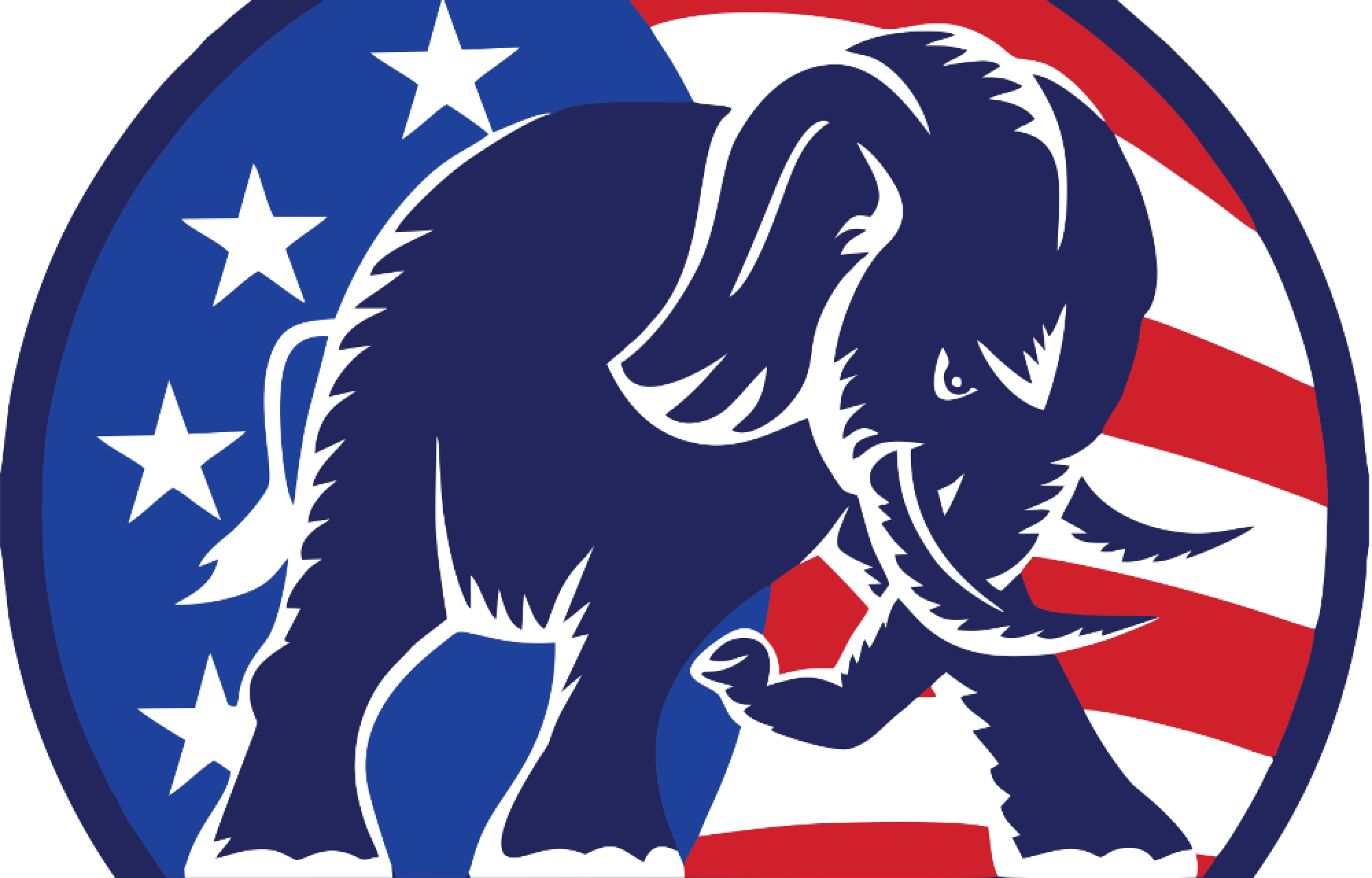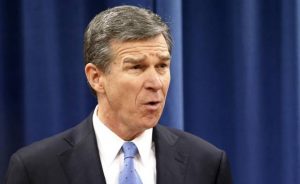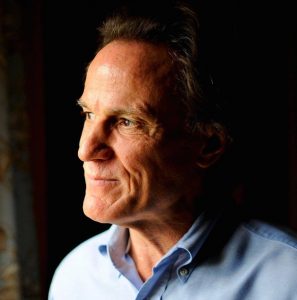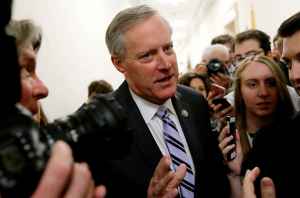I’ll admit it – Donald Trump was not the guy I wanted to see win the Republican nomination for President. But he did, he won election, and he is now my President.
His commencement speech at Liberty University yesterday impressed me. One reason is the fact that he spoke deeply, broadly, and powerfully about faith in a way I don’t recall ever seeing a President speak before.
Transcript:
Thank you very much. everybody. And congratulations to the class of 2017. That’s some achievement.
This is your day and you’ve earned every minute of it. And I’m thrilled to be back at Liberty University, I’ve been here, this is now my third time, and we love setting records, right. We always set records. We have to set records, we have no choice.
It’s been a little over a year since I’ve spoken on your beautiful campus and so much has changed. Right here, the class of 2017 dressed in cap and gown, graduating to a totally brilliant future. And here I am standing before you as President of the United States, so I’m guessing — there are some people here today who thought that either one of those things, either one, would really require major help from God. Do we agree? And we got it.
But here we are celebrating together on this very joyous occasion, and there is no place in the world I’d rather be to give my first commencement address as President than here with my wonderful friends at Liberty University. And I accepted this invitation a long time ago. I said to Jerry that I’d be there, and when I say something I mean it.
I want to thank President Jerry Falwell and his incredible wife, Becky, stand up, Becky, for their kind words, their steadfast support, and their really wonderful friendship. Let me also extend our appreciation to the entire Falwell family, Trey, Sarah, Wesley, Laura, and Caroline, thank you for everything you do to make this university so exceptional, one of the truly great, great schools.
Most importantly to our new graduates: Each of you should take immense pride in what you have achieved. There’s another group of amazing people we want to celebrate today and they are the ones who have made this journey possible for you, and you know who that is? Nobody, you forgot already. You’re going to go out, you’re going to do whatever you’re going to do, some are going to make a lot of money, some are going to be even happier doing other things — they’re your parents and your grandparents, don’t forget them. You haven’t forgotten yet, have you? Never, ever forget them, they’re great.
And especially this weekend, let’s make sure we give a really extra special thanks to the moms. Don’t forget our moms, because graduates, today is your day. Today is your day. But in all of this excitement don’t forget that tomorrow is Mother’s Day, right? I had a great mother, she’s looking down, now but I had a great mother. I always loved Mother’s Day.
We’re also deeply honored to be joined by some of the nearly 6000 service members, military veterans and military spouses who are receiving their diplomas today. Will you please stand. Please stand. Wow. That’s great. Thank you very much, great job. We’re profoundly grateful to every single one of you who sacrificed to keep us safe and protect God’s precious gift of freedom. It is truly a testament to this university and to the values that you embrace that your graduating class includes so many patriots who have served our country in uniform. Thank you very much.
To the class of 2017: Today you end one chapter but you are about to begin the greatest adventure of your life. Just think for a moment of how blessed you are to be here today at this great, great university, living in this amazing country, surrounded by people who you love and care about so much. Then ask yourself, with all of those blessings, and all of the blessings that you’ve been given, what will you give back to this country and, indeed, to the world? What imprint will you leave in the sands of history? What will future Americans say we did in our brief time right here on Earth? Did we take risks? Did we dare to defy expectations? Did we challenge accepted wisdom and take on established systems? I think I did, but we all did and we’re all doing it.
Or did we just go along with convention, swim downstream, so easily with the current and just give in because it was the easy way, it was the traditional way or it was the accepted way? Remember this, nothing worth doing ever, ever, ever came easy. Following your convictions means you must be willing to face criticism from those who lack the same courage to do what is right — and they know what is right, but they don’t have the courage or the guts or the stamina to take it and to do it. It’s called the road less traveled.
I know that each of you will be a warrior for the truth, will be a warrior for our country, and for your family. I know that each of you will do what is right, not what is the easy way, and that you will be true to yourself, and your country, and your beliefs. In my short time in Washington I’ve seen firsthand how the system is broken. A small group of failed voices who think they know everything and understand everyone want to tell everybody else how to live and what to do and how to think. But you aren’t going to let other people tell you what you believe, especially when you know that you’re right. And those of you graduating here today, who have given half a million hours of charity last year alone, unbelievable amount of work and charity and few universities or colleges can claim anything even close, we don’t need a lecture from Washington on how to lead our lives. I’m standing here looking at the next generation of American leaders. There may very well be a president or two in our midst. Anybody think they’re going to be president, raise your hand.
In your hearts are inscribed the values of service, sacrifice and devotion. Now you must go forth into the world and turn your hopes and dreams into action. America has always been the land of dreams because America is a nation of true believers. When the pilgrims landed at Plymouth they prayed. When the founders wrote the Declaration of Independence, they invoked our creator four times, because in America we don’t worship government we worship God. That is why our elected officials put their hands on the Bible and say, ‘So help me God,’ as they take the oath of office. It is why our currency proudly declares, ‘In God we trust,’ and it’s why we proudly proclaim that we are one nation under God every time we say the pledge of allegiance.
The story of America is the story of an adventure that began with deep faith, big dreams and humble beginnings. That is also the story of Liberty University. When I think about the visionary founder of this great institution, Reverend Jerry Falwell Sr., I can only imagine how excited he would be if he could see all of this and all of you today, and how proud he would be of his son and of his family.
In just two days we will mark the 10th anniversary of Reverend Falwell’s passing, and I used to love watching him on television, hearing him preach, he was a very special man. He would be so proud not just at what you’ve achieved but of the young men and women of character that you’ve all become. And Jerry, I know your dad is looking down on you right now and he is proud, he is very proud, so congratulations on a great job Jerry. Reverend Falwell’s life is a testament to the power of faith to change the world. The inspiring legacy that we see all around us in this great stadium — this is a beautiful stadium and it is packed. I’m so happy about that. I said, ‘How are you going to fill up a place like that?’ It is packed, Jerry.
In this beautiful campus and in your smiling faces but it all began with a vision. That vision was of a world class university for evangelical Christians. And I want to thank you, because boy did you come out and vote, those of you that are old enough, in other words your parents. Boy oh boy, you voted, you voted.
No doubt many people told him his vision was impossible, and I am sure they continued to say that so long after he started, at the beginning with just 154 students, but the fact is no one has ever achieved anything significant without a chorus of critics standing on the sidelines explaining why it can’t be done. Nothing is easier or more pathetic than being a critic, because they’re people that can’t get the job done. But the future belongs to the dreamers, not to the critics. the future belongs to the people who follow their heart no matter what the critics say because they truly believe in their vision.
At Liberty your leaders knew from the very beginning that a strong athletic program would help this campus grow so that this school might transform more lives. That is why a crucial part of Reverend Falwell’s vision for making Liberty a world-class institution was having a world-class football team much like the great teams of Notre Dame, great school, great place, in fact, Vice President Mike Pence is there today doing a fabulous job as he always does.
A few years ago, the New York Times even wrote a story on the great ambitions of the Liberty Flames. That story prompted a longtime president of another school to write a letter to Jerry. It’s a letter that Reverend Falwell would have been very, very pleased to read. Jerry tells me that letter now hangs in the wall in the boardroom of your great university. It came from the late Father Theodore Hesper, who was the beloved president of the university of Notre Dame 35 years ago. Like this school’s founder, he was a truly kindhearted man of very, very deep faith. In the letter, Father Hesper recalled that Notre Dame’s own meteoric rise from a small Midwestern school to a national football powerhouse. And then he wrote something so amazing and generous. He wrote, ‘I think you are on that same trajectory now and I want to wish you all the best and encourage you from the starting and from being able to start very small and arriving in the big time.’
Thanks to hard work, great faith, and incredible devotion those dreams have come true. As of February of this year, the Liberty Flames are playing in the FBS, the highest level of competition in NCAA football. Don’t, don’t clap, that could be tough. Don’t clap. That could be tough. I’m a little worried. I don’t want to look at some of those scores here. Jerry, you sure you know what you’re doing here? Those other players are big and fast and strong but I have a feeling you’re going to do very well, right?
From the most humble roots you’ve become a powerhouse in both education and sports. And just wait until the world hears the football teams you’ll be playing on your schedule starting next season. President Falwell gave me a list of some of those schools, the ones you’re going to be playing 2018. Would you like me to read the names? Just came out, would you like to hear them? I’m a little bit concerned. UMass, Virginia, Auburn — Jerry, are you sure you know what you’re doing? Jerry, Auburn? I don’t know about that James. This could be trouble, Jerry. Rutgers, Old Dominion, Brigham Young, Army — I might be at that game, who am I supposed to root for? Tell me. I don’t know. That’s a tough one, Jerry. I don’t know, Jerry, I’m going to have to think about that one, Jerry. Buffalo, Troy, Virginia Tech, oh no, Jerry, Ole Miss and wake forest, those are really top schools. maybe in four or five years I’ll come to a game, right, you’ll build it up. Well good luck.
The success of your athletic program arriving on the big stage should be a reminder to every new graduate of just what you can achieve when you start small, pursue a big vision and never, ever quit. You never quit. If I give you one message to hold in your hearts today, it’s this. Never, ever give up. There will be times in your life you’ll want to quit, you’ll want to go home, you’ll want to go home perhaps to that wonderful mother that’s sitting back there watching you and say, ‘Mom, I can’t do it. I can’t do it.’ Just never quit. Go back home and tell mom, dad, I can do it, I can do it. I will do it, you’re going to be successful. I’ve seen so many brilliant people, they gave up in life, they were totally brilliant, they were top of their class, they were the best students, they were the best of everything, they gave up. I’ve seen others who really didn’t have that talent or that ability and they’re among the most successful people today in the world because they never quit and they never gave up. So just remember that. Never stop fighting for what you believe in and for the people who care about you.
Carry yourself with dignity and pride. Demand the best from yourself and be totally unafraid to challenge entrenched interests and failed power structures. Does that sound familiar by the way? The more people tell you it’s not possible, that it can’t be done, the more you should be absolutely determined to prove them wrong. Treat the word ‘impossible’ as nothing more than motivation. Relish the opportunity to be an outsider. Embrace that label — being an outsider is fine, embrace the label — because it’s the outsiders who change the world and who make a real and lasting difference. The more that a broken system tells you that you’re wrong, the more certain you should be that you must keep pushing ahead, you must keep pushing forward.
And always have the courage to be yourself. Most importantly, you have to do what you love. You have to do what you love. I’ve seen so many people, they’re forced through lost of reasons, sometimes including family, to go down a path that they don’t want to go down, to go down a path that leads them to something that they don’t love, that they don’t enjoy. You have to do what you love, or you most likely won’t be very successful at it. So do what you love.
I want to recognize a friend who is here with us today, who can serve as an inspiration to us all. Someone who doesn’t know the meaning of the word ‘quit’. Real champion. A true, true champion. Both on the field, off the field, he’s a Hall of Fame quarterback for the Buffalo Bills, really a good friend of mine, an amazing guy, Jim Kelly, where is Jim, he’s here some place. Where is Jim, stand up, Jim. What a great man. Jim Kelly, he was tough. Jim do you have any idea how much money you’d be making today? They’d hit Jim, it was like tackling a linebacker. They’d hit Jim, four guy, five guys that weighed 320, and he’d just keep going down the field. He was much more than a quarterback. He had tremendous heart and he knew how to win. Jim is tough, and his toughest fight of all was that he beat cancer not once but twice.
And I saw him and his incredible wife as they were in a very low moment, Jill, very, very low moment, and it was amazing the way they fought. It didn’t look good, I would have said, maybe, maybe it’s not going to happen. But there was always that hope because of Jim and Jim’s heart. But I want to just say it’s great to have you here today Jim and these people are big, big fans and if you can get a young version of Jim Kelly, you’ll be beating a lot of teams, Jerry.
So, interestingly, though, I said ‘I wonder what Jim’s doing here,’ his daughter Erin crosses the goal line to you and today with you so, Erin, stand up. Where are you, Erin? Where is Erin? Congratulations, Erin. Congratulations. Graduating from Liberty. Great choice, thank you.
Liberty University is a place where they really have true champions and you have a simple creed that you live by: To be, really, champions for Christ. Whether you’re called to be a missionary overseas, to shepherd a church or to be a leader in your community, you are living witness of the gospel message of faith, hope and love. And I must tell you I am so proud as your president to have helped you along over the past short period of time. I said I was going to do it, and Jerry, I did it. And a lot of people are very happy with what’s taken place, especially last week, we did some very important signings, right James? Very important signings.
America is better when people put their faith into action. As long as I am your president, no one is ever going to stop you from practicing your faith or from preaching what’s in your heart.
We will always stand up for the right of all Americans to pray to God and to follow his teachings. America is beginning a new chapter. Today each of you begins a new chapter as well. When your story goes from here, it will be defined by your vision, your perseverance and your grit. That’s a word Jim Kelly knows very well, your grit. In this, I’m reminded of another man you know very well and who has joined us here today. His name is George Rogers, Liberty University CFO and vice president for a quarter of a century. During World War II, George spent three-and-a-half years as a prisoner of war. He saw many of his fellow soldiers die during the Bataan death march. He was the victim of starvation and torture as a prisoner of war. When he was finally set free he weighed just 85 pounds and was told he would not live past the age of 40. Today George is 98 years old.
Great. That’s so great, George. If anyone ever had reason to quit, to give in to the bitterness and anger that we all face at some point, to lose hope in God’s vision for his life, it was indeed George Rogers. But that’s not what he did. He stood up for his country, he stood up for his community. He stood up for his family and he defended civilization against a tide of barbarity, the kind of barbarity we’re seeing today and we’ve been witnessing over the last number of years and I just want to tell you as your president, we are doing very, very well in countering it, so you just hang in there. Things are going along very, very well. You’ll be hearing a lot about it next week from our generals Things are going along very, very well.
Through it all, he kept his faith in God, even in the darkest depths of despair. Like so many others of his generation, George came home to a nation full of optimism and pride and began to live out the American dream. He started a family, he discovered God’s plan for him and pursued that vision with all his might, pouring his passion into a tiny college in a place called Lynchburg, Virginia. Did you ever hear of that? Lynchburg? We love, we love it. Do you like it? We like it, right? I flew over it a little while ago. It’s amazing, actually. What started as a dream with a few good friends he helped shepherd into the largest Christian university in the world. Just look at this amazing, soaring, growing campus and I’ve been watching it grow because I’ve been a friend of Liberty for a long time, now, Jerry. It’s been a long time.
Thanks in great part George’s financial stewardship hundreds of thousands of young hearts and souls have been enriched at Liberty and inspired by the spirit of God. George, we thank you, and we salute you, and you just stay healthy for a long time, George, thank you.
Now it falls on the shoulders of each of you here today to protect the freedom that patriots like George earned with their incredible sacrifice. Fortunately you have been equipped with the tools from your time right here on this campus to make the right decisions and to serve God, family and country. As you build good lives, you will also be rebuilding our nation. You’ll be leaders in your communities, stewards of great institutions and defenders of liberty and you will be great mothers and fathers and grandmothers and grandfathers, loving friends and loving family members. You will build a future where we have the courage to chase our dreams no matter what the cynics and the doubters have to say. You will have the confidence to speak the hopes in your hearts and to express the love that stirs your souls. And you will have the faith to replace a broken establishment with a government that serves and protects the people.
We must always remember that we share one home and one glorious destiny whether we are brown, black or white. We all bleed the same red blood of patriots. We all salute the same great American flag, and we are all made by the same almighty God. As long as you remember what you have learned here at Liberty, as long as you have pride in your beliefs, courage in your convictions and faith in your God, then you will not fail.
And as long as America remains true to its values, loyal to its citizens, and devoted to its creator, then our best days are yet to come, I can promise you that. This has been an exceptional morning. It’s been a great honor for me and I want to thank you, the students. I also want to thank you, the family, for getting them there ,and I want to thank and congratulate Liberty. May God bless the class of 2017. May god bless the United States of America. May God bless all of you here today. Thank you very much, thank you. Thank you.





 “The agriculture and forestry industries are vital to our economy and we should encourage them to thrive. But nuisance laws can be used to protect property rights and make changes for good,” Cooper said in his veto message, adding that eroding nuisance actions “can allow real harm to homeowners, the environment and everyday North Carolinians.”
“The agriculture and forestry industries are vital to our economy and we should encourage them to thrive. But nuisance laws can be used to protect property rights and make changes for good,” Cooper said in his veto message, adding that eroding nuisance actions “can allow real harm to homeowners, the environment and everyday North Carolinians.” My name is Nicholas Williams, I am a sophomore economics major at Appalachian State University. I am currently the Co-President of Appalachian State Young Americans for Liberty. Upon my tenure as a student at Appalachian State University, I have served as a student government Senator, a member of university committees, and an executive member for other various advocacy and academic organizations on campus.
My name is Nicholas Williams, I am a sophomore economics major at Appalachian State University. I am currently the Co-President of Appalachian State Young Americans for Liberty. Upon my tenure as a student at Appalachian State University, I have served as a student government Senator, a member of university committees, and an executive member for other various advocacy and academic organizations on campus.


 The White House and much of the Republican establishment have settled on a familiar scapegoat: the famously stubborn 30 or so members of the House Freedom Caucus. On Thursday morning, President Trump tweeted: “The Freedom Caucus will hurt the entire Republican agenda if they don’t get on the team, & fast. We must fight them, & Dems, in 2018!”
The White House and much of the Republican establishment have settled on a familiar scapegoat: the famously stubborn 30 or so members of the House Freedom Caucus. On Thursday morning, President Trump tweeted: “The Freedom Caucus will hurt the entire Republican agenda if they don’t get on the team, & fast. We must fight them, & Dems, in 2018!”